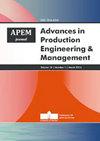Manufacturer’s customer satisfaction incentive plan for duopoly retailers with Cournot or collusion games
IF 2.8
3区 工程技术
Q2 ENGINEERING, MANUFACTURING
引用次数: 5
Abstract
To increase customer satisfaction (CS) which is closely linked to corporate reputation, revenue and customer loyalty, manufacturers will provide incen‐ tives to retailers in supply chain management. This paper focuses on two types of incentives that a manufacturer may provide to retailers: customer satisfaction index bonus (CSI bonus) and customer satisfaction assistance, and studies the optimal customer satisfaction incentive plan of the manufac‐ turer when duopoly retailers adopt Cournot or collusion game. By comparing the equilibrium of the two games, we conducted a preference analysis of both the manufacturer and the retailers. The results showed that no matter what kind of games the duopoly retailers take, the manufacturer will provide cus‐ tomer satisfaction assistance to the retailers to increase the customer satis‐ faction. However, if the duopoly retailers take Cournot behaviour, only when the wholesale price is greater than the threshold, the manufacturer will pro‐ vide the retailers with customer satisfaction index bonus. The manufacturer always prefers to Cournot behaviour, and the retailers always prefer to collu‐ sion behaviour. In addition, this paper also investigated the effect of custom‐ er satisfaction incentives on the manufacturer, and found that it will help the manufacturer obtain more demand and higher profits. © 2020 CPE, University of Maribor. All rights reserved.双寡头零售商与古诺或共谋博弈的制造商顾客满意度激励方案
为了提高与企业声誉、收入和客户忠诚度密切相关的客户满意度,制造商将在供应链管理方面为零售商提供激励。本文主要研究了制造商对零售商提供的两种激励类型:顾客满意指数奖励和顾客满意协助,并研究了双寡头零售商采用古诺博弈或共谋博弈时制造商对零售商的最优顾客满意激励方案。通过比较两种博弈的均衡性,对制造商和零售商进行了偏好分析。结果表明,无论双寡头零售商采取何种博弈方式,制造商都会向零售商提供顾客满意度协助,以提高零售商的顾客满意度。然而,当双寡头零售商采取古诺行为时,只有当批发价格大于阈值时,制造商才会向零售商提供顾客满意度指数奖励。制造商倾向于古诺行为,零售商倾向于串谋行为。此外,本文还研究了客户满意度激励对制造商的影响,发现它有助于制造商获得更多的需求和更高的利润。©2020 CPE,马里博尔大学。版权所有。
本文章由计算机程序翻译,如有差异,请以英文原文为准。
求助全文
约1分钟内获得全文
求助全文
来源期刊

Advances in Production Engineering & Management
ENGINEERING, MANUFACTURINGMATERIALS SCIENC-MATERIALS SCIENCE, MULTIDISCIPLINARY
CiteScore
5.90
自引率
22.20%
发文量
19
期刊介绍:
Advances in Production Engineering & Management (APEM journal) is an interdisciplinary international academic journal published quarterly. The main goal of the APEM journal is to present original, high quality, theoretical and application-oriented research developments in all areas of production engineering and production management to a broad audience of academics and practitioners. In order to bridge the gap between theory and practice, applications based on advanced theory and case studies are particularly welcome. For theoretical papers, their originality and research contributions are the main factors in the evaluation process. General approaches, formalisms, algorithms or techniques should be illustrated with significant applications that demonstrate their applicability to real-world problems. Please note the APEM journal is not intended especially for studying problems in the finance, economics, business, and bank sectors even though the methodology in the paper is quality/project management oriented. Therefore, the papers should include a substantial level of engineering issues in the field of manufacturing engineering.
 求助内容:
求助内容: 应助结果提醒方式:
应助结果提醒方式:


